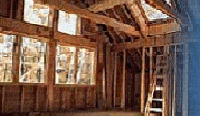Houston - Galveston Coastal Home Inspections I Infrared Thermography |
||
 |
 |
||
 |
|||
 |
||||
When Your Realtor Recommends a House Inspector Be very careful using the real estate inspector your Realtor commonly recommends. Your interests are best served by having a thorough, detailed inspection performed on the house you want to buy. Your Realtors interests are not. Your Realtor only gets paid when you close on your new home. Anything that threatens the deal or delays the closing is not in your Realtor’s interest. If major problems are discovered during the inspection and you decide that it is your best interest to back out of the deal, your Realtor looses all the time and money he or she has invested in you on that house. And never forget that your Realtor is ultimately paid by the seller of the house. The purpose of a real estate inspection is to find indications of major problems that may exist in the house you want to buy. If indications of major problems are found, further investigations must be performed which may include destructive testing. When the extent of the problem is discovered, repairing the problem and restoring the cosmetic finishes may take some time. During all that time, your Realtor remains unpaid. Many, many Realtors prefer to recommend house inspectors who simply don’t find problems. Realtors think of these inspectors as facilitators and as third party liability carriers. The inspector doesn’t find any problems and you are not alarmed. If something goes wrong after you close on the house, your Realtor simply tells you to contact the inspector and to have the inspector make the repairs. But your deal went smoothly and your Realtor got paid. And that is all that matters to your Realtor. The house inspector got paid and he kept his real client. The Realtor. Almost all house inspectors market to, and solicit business from, Realtors. It is hard for house inspectors to find individual buyers. It’s easy for inspectors to go to a Realtor’s office. Should the inspector actually perform his job and he finds problems with the house you want to buy, he would loose his real client and his marketing efforts and expenses would have been wasted. But, what happens to you if major problems go undetected? You are left with the major problems. Even if your inspector makes the repairs, you have to take time off from work and disrupt your life while the repairs are made. Your lifestyle is disrupted and your new house is a mess. If your inspector refuses to make the repairs, you may be stuck with paying for damages that could have been discovered during your inspection. If you had hired a competent inspector instead of the one your Realtor really likes. When you are buying a new house, be very careful hiring an inspector who markets to Realtors. While there are some honest, ethical Realtors who do a great job for their buyers and while there are a very few number of house inspectors who market to Realtors who actually perform good inspections, the odds are against you. Your best bet is to ask your family and friends or your attorney for a referral for a real estate inspector, check the inspector’s website and ask for a sample inspection report. If you don’t understand the sample report or if the information on the report is not complete enough to help you understand the issues with the house, keep on shopping. Saving a little time on researching a house inspector or saving a few dollars on the inspector’s fee can cost you a lot of money and aggravation. And don’t worry about your Realtor’s feelings. When you close and your Realtor gets paid, your Realtor will be just fine. Credit: Fred Willcox, Houston |
||||
"Don't worry honey, it's a 30 year roof". Wrong!
When a home is built the usual builder has a one-year warranty. That includes the roof. The roof covering manufacturer does not warrant the installation or for roof leaks. If someone makes such a claim then they are usually trying to sell you something. Shingles do not have manufacturer tags or markings on them. Who are you going to call anyway? Additionally, roof contractors are not licensed in Texas. Anyone can be one today and gone tomorrow.
Welcome to the southern United States hot/humid climate. Generally, asphalt (composition) shingles have a typical lifespan of 12-15 years in hot/humid environments and regardless of its material age and condition insurance companies tend to have their own idea of shortened lifespan when it comes to insurability and/or depreciation. With lack of proper attic ventilation you can take off 3-5 years of estimated life and lack of proper ventilation voids any manufacturer material warranty.
From Dallas to Galveston, El Paso to Beaumont many home inspectors may spend an hour and a half on a home when it should take around 4 hours or so to properrly follow the statewide inspection standards. These inspection flippers usually do not want you at the inspection and the experienced inspectors know why. Whether they own a ladder or even use one is questionable. At least reputable inspectors will include roof photos in a report as documentation that they were on the roof.
If you live in a coastal Texas county then you have the added Texas Windstorm Insurance Association that, if you watch the news, may be somewhat evil when it comes to paying windstorm claims even on new roofs. Roofs blow off in high wind zones. Shinges are not listed/rated/warranted for high windspeeds. (Shingles in coastal area may be limited to 110 m.p.h. speeds based on a 3 second gust. If you live in a 120 or 130 wind zone then you exceed the shingle listing/rating/warranty.)
What wears out the composition shingle? The actual life of a composition roof will vary, depending on a number of interrelated factors besides the quality of the material and the method of installation such as but not limited to; exposure to sunlight, slope of the roof, ventilation of attic spaces, and color of the shingles; (dark shingles achieve lower life spans) and biological attacks. Dark shingles have a significant amount of thermal mass. They soak up the sun’s heat. The darker the shingle the hotter the roof gets.
Additionally the thicker the composition shingle the more heat it absorbs and stores and is negatively affected by this heat. This means that not only do they soak up the sun’s heat like a sponge, but they also hold a tremendous amount of this heat to after sunset and then release this heat into the structure at night. Testing done by Florida Solar Energy Center showed that over 20% of the typical home cooling load comes from heat gain. The average 2000 sq. ft. roof can receive over 24 million BTUs of the sun’s radiant heat per year. (That equals 2,000 tons of air-conditioning!)
Additionaly with dark colored shingles the minimum standard of attempting to ventilate (i.e. cool down) an attic space and rood deck may be unrealistic which has a shortening effect on shingle life.
Granule loss of shingles starts from the time of installation and increases with age from heat and erosion from water running down the roof slope. The granules are designed to deflect the deteriorating ultra-violet rays of the sun and heat and provide a fire-resistance. The fire-resistance of shingles decreases with the rate of granule loss. Roof rock granule loss, exposed fiberglass matrix at edges and brittleness of the roof covering is indicative of the roof covering in its last stage of serviceable life and you are recommended to budget for replacement.
